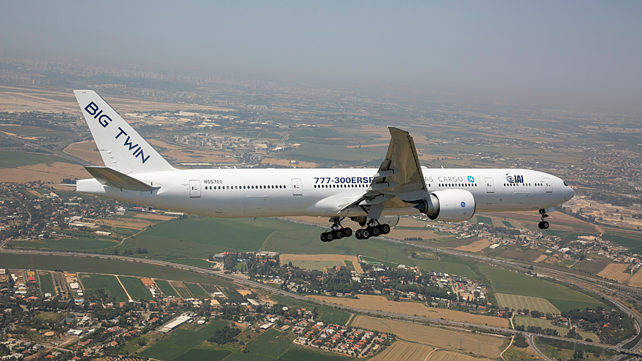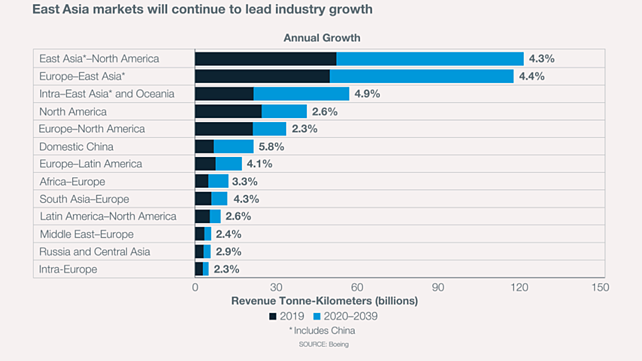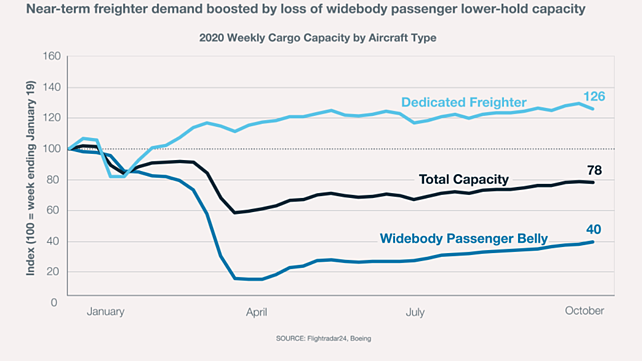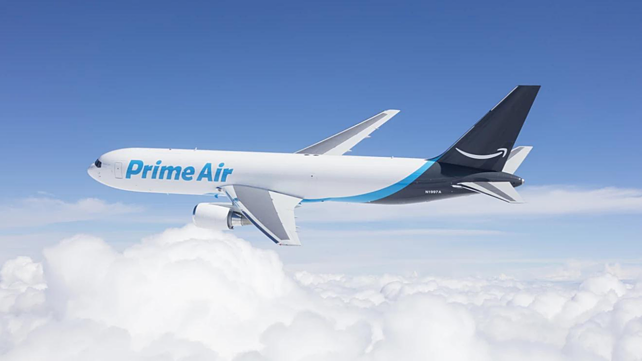
The growing need to support global E-commerce, Express Cargo, transportation of COVID-19 vaccines, and delivery of humanitarian relief and medical goods will drive a recovery in global freighter demand. Demand for E-commerce is already accelerating as more and more businesses shift to online selling platforms. Boeing’s biennial World Air Cargo Forecast (WACF), released in November 2020, states that world air cargo traffic will grow at 4% annually over the next 20 years, ‘influenced by trade and growing express shipments to support expanding e-commerce operations.’
Global cargo and freight operations were significantly impacted in 2019 when airlines were forced to park thousands of aircraft due to COVID-19 pandemic travel restrictions. This reduced considerably the available passenger aircraft belly cargo capacity, which accounted for approximately half of global air cargo capacity, before the pandemic.
Darren Hulst, Vice President, Commercial Marketing, Boeing, said, “Looking ahead, dedicated freighters will be even more critical to compete in air cargo markets; they carry more than half of air cargo traffic, and airlines operating them earn nearly 90% of air cargo industry revenue.” To cater to the increased market demand for freighter aircraft, global providers are already stepping in, especially for the conversion of older passenger aircraft to freighter aircraft, as this provides freight operators with more fuel-efficient aircraft and a way for airlines/lessors to dispose of excess aircraft capacity in their fleets.
Key Reasons For Freighter Preference In Air Cargo
1) Most passenger belly capacity does not serve key cargo trade routes
2) Twin-aisle passenger schedules often do not meet shipper timing needs
3) Freight forwarders prefer palletised capacity, which is not available on single-aisle aircraft
4) Passenger bellies cannot serve hazardous materials and project cargo
5) Payload-range considerations on passenger airplanes may limit cargo carriage, which decreases the likelihood that cargo will arrive at its destination on time.
SOURCE: Boeing World Air Cargo Forecast
Demand-driven
In May, Singapore Technologies Engineering (ST Engineering) announced that its wholly-owned aviation asset management unit would set up a 50-50 joint venture (JV) for freighter aircraft leasing in partnership with Singapore Government-owned investment firm Temasek. Aimed at addressing fast-growing freighter aircraft demand generated by expanding global e-commerce and air cargo volumes, the JV will invest in passenger aircraft converted into freighter aircraft. It has plans to create a portfolio valued at approximately $600 million (INR 4,500 crore) within five years using aircraft financing done through a mix of equity and debt. ST Engineering will be the asset and lease manager to the JV and also provide MRO services for these aircraft.

Boeing is the global air-cargo aircraft market leader, with more than 90% of the dedicated freighter capacity worldwide, including new production and converted freighters. For narrowbody freighters, Boeing converts 737-800 passenger airplanes to freighters at three locations: Boeing Shanghai Aviation Services (BSAS) in Shanghai, Guangzhou Aircraft Maintenance Engineering Company (GAMECO) in Guangzhou, and Taikoo (Shandong) Aircraft Engineering (STAECO) in Jinan, China.
The airframer is adding additional conversion capacity for its 737-800 Boeing Converted Freighter to meet the growing demand. Two new 737-800BCF conversion lines are slated to open in 2022. Boeing has received orders for more than 180 737-800BCF freighters.
Israel Aerospace Industries’ (IAI) Aviation Group announced in May that it would establish a Passenger 2 Cargo (P2F) conversion site in South Korea for Boeing 777-ERSF (Big Twin) jetliners. IAI’s new facility will specialise in converting B777-300ER and B777-200LRs to Big Twins in association with its South Korean partners. Starting 2024, IAI will convert six B777-300ER and B777-200LRs into Big Twins, and it aims to have the first B777 P2F conversion prototype certified in 2023.

In growth mode
Amazon Air which was launched in 2016 to meet the logistics needs of e-commerce parent Amazon, is growing at a scorching pace and will attain an aircraft fleet size of just over 90 aeroplanes by 2022. The fleet size at the end of 2021 is estimated to reach 85 aircraft. Amazon Air operates a mix of both leased and owned aircraft and, between June 2020 to January 2021, placed orders for 23 freighter aircraft to support its growing operations. In January, it made its first-ever purchase of eleven Boeing 767-300 aircraft, seven from Delta and four from WestJet, both American passenger airlines. Passenger to Cargo conversion is underway for the aircraft purchased from WestJet and will start service in 2021, while the seven aircraft from Delta will enter Amazon’s air cargo network in 2022.

Amazon Air leased 12 Boeing 767-300 converted cargo aircraft from Air Transport Services Group (ATSG) in June 2020. One of the new aircraft joined Amazon’s air cargo operations in May 2020, and the remaining 11 will be delivered this year. Amazon Air says it will continue to rely on third-party carriers to operate these new aircraft, which means that pilot and maintenance crews are outsourced. Amazon opened its first-ever air hub at Leipzig/Halle Airport in Germany in 2020 and will open a major new hub in the USA at the Cincinnati/Northern Kentucky International Airport (CVG) later this year. Amazon is investing $ 1.5 billion at CVG that will include leasing more than 1,100 acres and constructing three million square feet of buildings to support an eventual fleet of more than 100 Prime Air cargo planes.